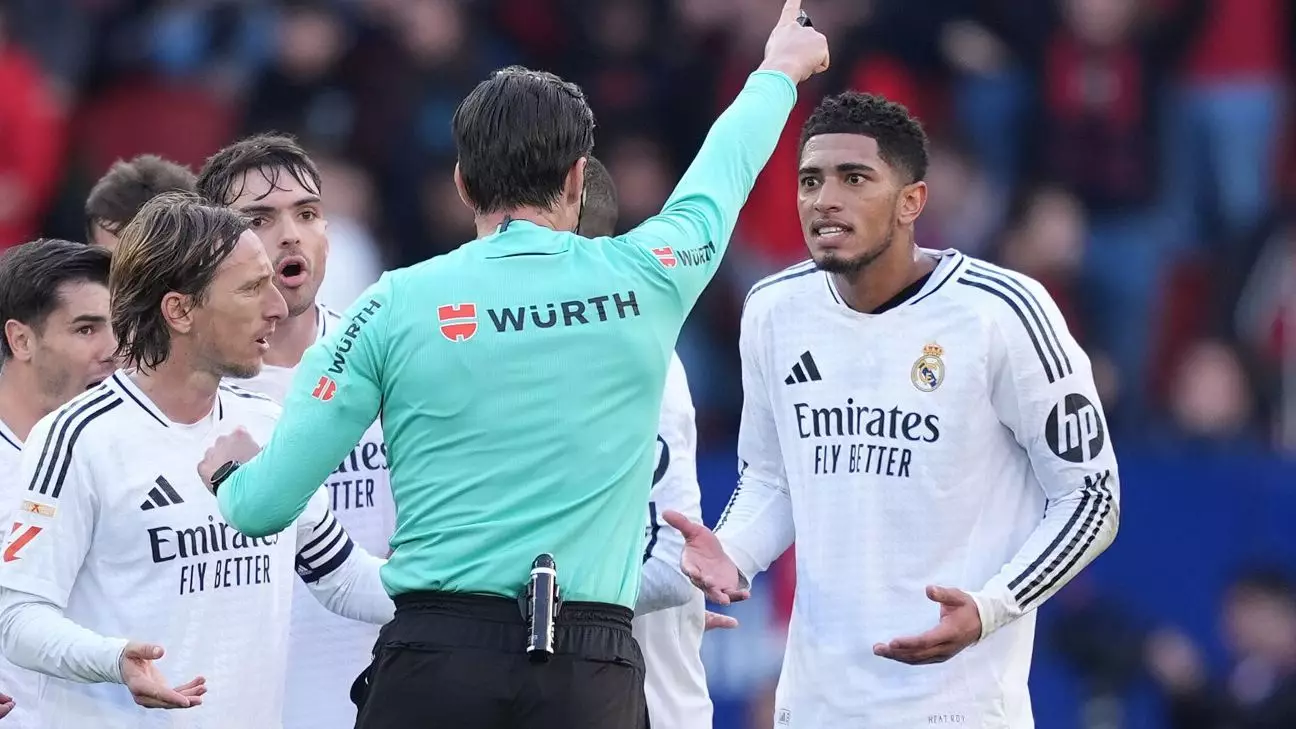In the world of competitive football, discipline and respect for officials are paramount, not only for the integrity of the game but also for a team’s performance on the pitch. Recent events surrounding the relationship between players and referees have sparked significant discussion, particularly regarding a notable incident involving Jude Bellingham of Real Madrid. Following his dismissal for verbally contesting a referee’s decision during a match against Osasuna, Barcelona’s coach, Hansi Flick, took this opportunity to send a strong message to his squad about maintaining composure and avoiding unnecessary confrontations with match officials.
Flick’s admonition against what he categorizes as “weakness” in arguing with referees speaks volumes about his coaching philosophy. By classifying such behavior as a waste of energy, he underscores the importance of strategic focus in high-pressure situations. A coach’s primary goal should be to earn as many points as possible throughout the season, and engaging in disputes with referees can lead to costly mistakes such as red and yellow cards, which directly affect a team’s chances of winning.
The incident involving Bellingham, who has since clarified that his comments were not intended to be disrespectful but rather a moment of frustration, highlights a broader issue in football. Emotional responses can cloud judgment and lead players to make decisions that ultimately harm their teams. Flick’s emphasis on discipline is not merely a tactical approach; it reflects a deep understanding of the mental strains that players face during matches. He is aware that adversities on the pitch can trigger outbursts, yet he stresses the necessity of controlling these impulses for the collective good of the team.
Flick’s comments were not merely reactive but strategic. He pointed out that only the team captain is authorized to engage with referees, thereby encouraging his players to channel their grievances through a designated leader rather than taking matters into their own hands. This structured approach to addressing refereeing decisions fosters a culture of accountability, unity, and discipline within the squad.
As Barcelona gears up for its upcoming match against Rayo Vallecano, the echoes of Flick’s tactical philosophy become increasingly relevant. Despite Real Madrid’s slip-ups and Atlético Madrid’s recent draw, Barcelona’s focus remains diligently on their own performance rather than the league standings. Flick’s perspective emphasizes the long-term game strategy, noting that maintaining consistency over the season is far more crucial than getting preoccupied with immediate results.
With Barcelona currently enjoying an unbeaten streak of 11 matches, the coach finds himself in a position to reinforce the importance of mental resilience as the team approaches critical fixtures. Rayo Vallecano, a team that has recently demonstrated commendable performance, will not be an easy opponent. Flick recognizes the competitiveness of their style of play and highlights the meticulous preparations required to face them. His remarks on Rayo Vallecano’s intensity serve as both an acknowledgment of the opposition and a motivational challenge for his players.
In terms of team readiness, Flick has assured fans that injury concerns are minimal, with key players set to participate in the upcoming match. The mention of Ronald Araújo’s fitness is a relief, considering the defensive responsibilities that will be crucial against a vibrant Rayo Vallecano side. Flick’s approach to managing player health and performance could be seen as a reflection of his broader strategy—optimizing every resource at his disposal while ensuring his players are mentally and physically prepared.
Hansi Flick’s leadership as the coach of Barcelona rests on layers of tactical intelligence, emotional regulation, and team cohesion. His decisive stance against unnecessary disputes with officials serves not only as a directive but as a foundational element of his philosophy—promoting a disciplined approach to the game, thereby enhancing Barcelona’s capabilities as they chase their ambitions for the season. The blend of emotional intelligence and tactical acumen is vital, as Barcelona navigates the challenges ahead in their La Liga campaign.
